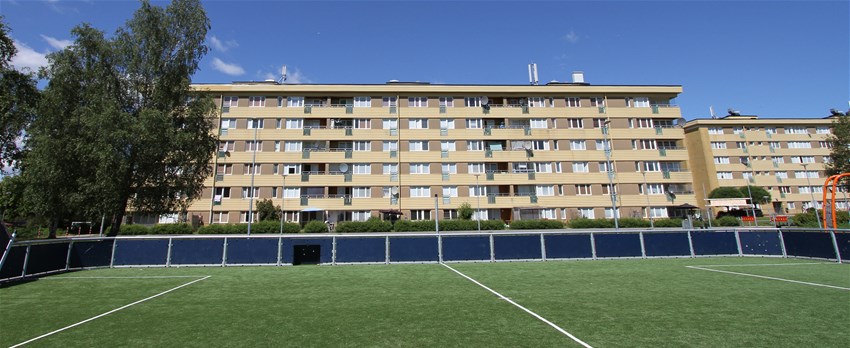Research project aims to increase acceptance for smart mobility
23 Sep 2020
Ten households in the residential area Granngården in Trollhättan will share electric cars with each other for one month as part of a pilot study. Behind the study are University West through the research project SESMA, together with NEVS and Eidar. An important goal is to promote the development of car sharing services and smart mobility in Trollhättan and other smaller cities.

Car sharing contributes to an increased sustainability, not only ecologically but also socially and economically. In metropolitan regions around Europe, car sharing is becoming more common. There are often several different services available in the same city, but in many smaller cities the alternative is completely lacking.
SESMA (sharing economy and smart mobility acceptance) is a research project that aims to increase acceptance of smart mobility solutions, such as car sharing, with a focus on smaller cities. The project is run by University West together with the City of Trollhättan, NEVS and RISE.
- A focus in SESMA is that there are few studies done on mobility habits and the possibilities for car sharing in cities of Trollhättan’s size, says Malin Pongolini from University West, researcher in the project. The focus usually lies on larger cities, such as Stockholm or Gothenburg, where the conditions are completely different.
Now the project SESMA, together with NEVS and Eidar Trollhättans Bostadsbolag, is conducting a pilot study that involves letting about ten people from different households in Granngården be part of a carpool. They will be able to share two electric cars parked in the area for just over one month.
- The purpose is to find out what the participants need the car for and what their habits of transport look like, Malin Pongolini explains. We also want to understand how people experience letting go of what they own and instead share a car with others who live in the same area.
Important aspects of the SESMA project are ecological, economic, and social sustainability. Therefore, the choice of residential area is extra relevant.
- We have already done a smaller, similar study in another residential area here in Trollhättan, says Malin and continues, where the participants used an already existing carpool. The idea with this study in Granngården is that we also want to examine areas with a different socio-economic structure.
Eidar hopes to be able to offer car sharing to its tenants in the future
Eidar plays an important part in the pilot study. Among other things, they have facilitated the contact between SESMA and the residents and provided the study with one of the two electric cars. The second car is provided by NEVS.
At Eidar sustainability is an important focus. They have an idea that their vehicles being used during the day by civil servants also could be used in the evenings and on weekends by their tenants.
- We have for a time been wanting to use our vehicles in a more efficient way than we have done so far, explains Owe Lång, CFO at Eidar. Yet, we have not found the method for this yet, so when SESMA reached out about the pilot study it was an easy decision for us to make - we are more than happy to participate in the project.
According to Owe Lång, Eidar wants to help the residents of Trollhättan open their eyes to this type of mobility service with the goal of contributing to a more environmentally friendly city, where car sharing is a natural element.
The pilot study offers important input for NEVS
NEVS is not only part of the research project SESMA but has also developed the app, NEVS Share, which is used for booking the cars in the carpool.
Nadia Smit, project manager at NEVS, says that the ambition is to have one mobility system throughout the whole country, where the first pilot with self-driving vehicles, Sango, is planned to start in the next few years in Stockholm. Like Malin Pongolini, Nadia Smit points out that most attempts at car sharing today are focused on larger cities.
- As of now, we are working out different scenarios for how the business models can be adapted to make car sharing work in smaller cities, Nadia Smit explains. It is very important to have input so that we can adapt our offer, so that people choose car sharing instead of owning their own car, Nadia concludes.
Many bookings even before the study started
The pilot study begun last week, with a test week. The participants then had the opportunity to start using the carpool with extra support from the project's three partners.
- During the test week, we wanted to help the participants get over all the thresholds, Malin Pongolini explains. There has already been a very high number of bookings during the test week, but it is not until now this week that we start measuring and collecting data, she concludes.
The pilot study ends in late October with interviews with the participants
SESMA is a research project in collaboration between University West, NEVS, RISE and the City of Trollhättan and is ongoing 2019–2021. Read more about the project at www.hv.se/sesma.
The project is funded by Vinnova and Drive Sweden. Drive Sweden is one of the Swedish government’s 17 Strategic Innovation Programs (SIPs). Drive Sweden consists of partners from academia, industry and society and together we address the challenges connected to the next generation mobility system for people and goods. The SIPs are funded by the Swedish Innovation Agency Vinnova, the Swedish Research Council Formas and the Swedish Energy Agency. Drive Sweden is hosted by Lindholmen Science Park AB.
(Photo by Eidar)


